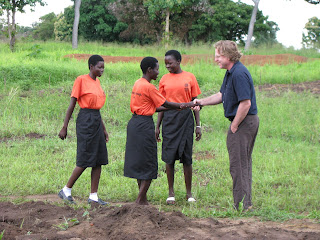YouMoveMe.org, an organization that produces stories about youth from around the world overcoming hardships and sharing life's lessons, is publishing an essay about Neema Nyoka, a NESEI student. As you may remember, back when Neema was an applicant to our school, we told you a story about her life. Now, You Move Me has written an update, in Neema's voice. The article will be shared with students at schools across the U.S., with the intention of helping them get involved with NESEI's efforts. Please enjoy this article, whose link is below, and check out the good work that You Move Me is doing!
"A Guarantee from Sudan"
We used to play “family” with my friends in the backyard of my grandmother’s house. Playing family is the most common children’s game in Africa. We used to pretend that we were in a happy family with both a mother and father: the ideal family. I like happy families. The father would go to work in town and the mother (often played by me) would stay home to cook and take care of the children. That game is my favorite childhood memory. It was my way of having a real family, and it still is.
I was driven to work hard because I wanted to stay in school. School is not free here, and I struggled to pay the fees. My step-parents did not want to pay the fees because my step-mother said it was useless for girls to get an education. But I was determined to stay in school, so I earned my own tuition by carrying water for the brick-makers on Saturdays and Sundays. It takes about 12 buckets to fill one drum of water, and I earned $2 for every drum of water I filled.
But now, my friends, I am very happy to tell you that I no longer carry water to go to school. I have earned a scholarship to attend a high school built by the New Sudan Education Initiative (NESEI), and I now spend my weekends working on my studies instead of carrying water in the hot sun. Because of these efforts, I am the top-ranked student at the school and also the student body president.
If we want to make the world a better place for them – and for everyone – we will need more love and unity. I have always believed that if people in the whole world loved each other there would be no war, no hatred, no fighting or genocide in Darfur. And we must care for children, because they are the keepers of tomorrow’s world. I want to give my children the best education imaginable. Love guarantees all these things.
Neema earned her scholarship through the New Sudan Education Initiative (NESEI), a US-based non-profit founded by Sudanese refugees that is building high schools in Sudan. If you, your classmates, or your whole school would like to help provide a scholarship for a girl like Neema, please visit http://www.nesei.org/ to learn how.
Discussion questions:
1. What are some things for which you have had to work very hard in your own life? How were your efforts similar to Neema’s efforts? How were they different?
2. If you had to earn your own tuition to go to school, would you be willing to spend your weekends carrying water?
3. Neema says she especially wants to help orphans and widows because of her personal experiences. Are you motivated by any personal experiences of your own?
4. Neema says that education is “paving a way” for her to help meet life’s basic needs. What are the various ways in education can help to overcome poverty?
www.youmoveme.org/neema.html

 audience. Corn that had been grown at the NESEI campus was eaten at the bonfire, to celebrate a good harvest.
audience. Corn that had been grown at the NESEI campus was eaten at the bonfire, to celebrate a good harvest. 
 excess yield that has been sold to local businesses and markets.
excess yield that has been sold to local businesses and markets.


